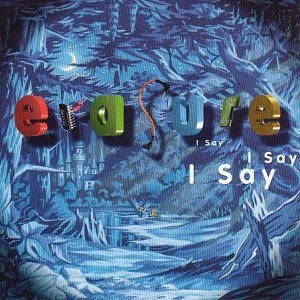(#501: 28 May 1994, 1 week)
Track listing: Take Me Back/I Love Saturday/Man In The Moon/So The Story Goes/Run To The Sun/Always/All Through The Years/Blues Away/Miracle/Because You’re So Sweet
If you fancy yourself as a music writer, the acid test isn’t tackling one of the “big” records. Instead, try having a go at evaluating the sixth studio album by Erasure. That should sort out the determined from the just pretending.
What I would say is that a lot of this record is devoted to worship of the bucolic, the natural order of things. Its cover depicts a tinselly wonderland, full of forests and castles, and in the far distance, the heads of Andy Bell and Vince Clarke, barely above the water; it is impossible to discern whether they are swimming or drowning.
What I Say I Say I Say could be is an unusually elegant, not to say elegiac, Erasure record. Much of its music floats rather than impressing itself on the listener. Songs such as “Man In The Moon” and “All Through The Years” nightswim with balletic patience. Even its uptempo songs – “I Love Saturday,” “Run To The Sun” – are comparatively restrained, and not without bitter subtexts; the payoff line to the former is the rhetorical question “Did I try to deny we would fall apart?,” while the latter offers a brief impasse of dissonance just before the phrase “It’s not that I’m ashamed.”
These ten songs may be thematically linked – there is an undercurrent throughout the record of a love spent, then lost, then painfully recovered, such that when we reach the hymnal “Miracles” there is a palpable sense of redemption (as underlined by the accompanying choir). But its general tenor is the advice to slow down, observe and wait, and also to love the real world of nature which is surrounding, or should surround, you.
Martyn Ware produced, which may explain why the album is more Sheffield than Basildon; there is far less camp and much more seriousness. “Always,” an unexpected Billboard top twenty single, is classically structured, flawless pop, but also a song sung with a maturity that would have been unreachable for Bell even five years previously. On “Take Me Back,” with its subtle lyrical nod to “Nights On Broadway” (“Trapped in a world full of strangers”), and “Man In The Moon,” Bell’s unexpected mezzo-soprano kisses the brim of androgyny like few singers since Klaus Nomi. Yet this approach also permits the sense of absolute, elated deliverance exultantly expressed in “Because You’re So Sweet.”
The album’s most striking moment comes with “So The Story Goes,” which gradually diverts from its initial premise to a kaleidoscope of polytonal choral lines and gruffly-spoken recitations with a sense of adventure that recalls the Orchestral Manoeuvres In The Dark of 1981 and 1983. My feeling is that Vince and Andy had probably realised that their imperial phase was over, and thus they were free to do whatever the heck they liked. Their next, self-titled album, released in 1995, took this sense of experimentation further; Diamanda Galas is involved in places, and the overall mood is perhaps one of extending the implications of trance (in particular the work of The Orb). It peaked in Britain at number fourteen. They persisted and endured, however, and remain productive with an intensely devoted following. We will not hear from Erasure again in this tale, but their story is one of friendly persistence. They have kindly not left the stage.



